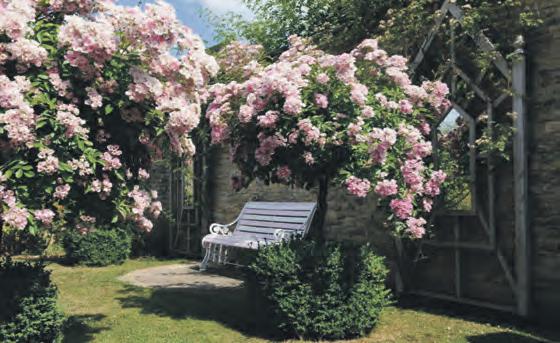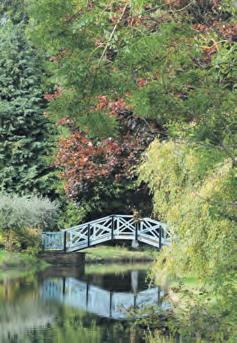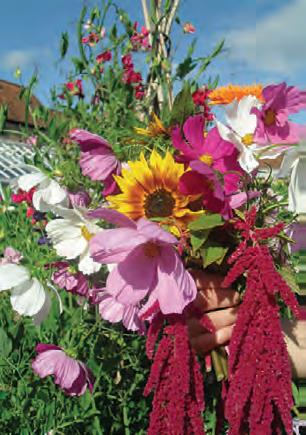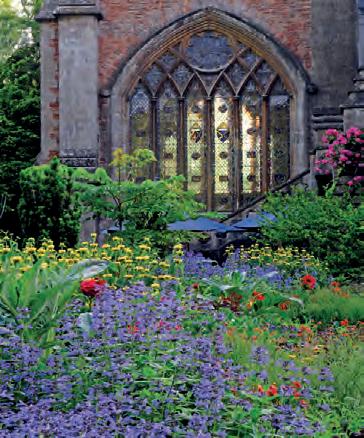
18 minute read
literally reach for the sky
Preparing containers
Almost anything can be used as a container. Almost any vegetable that can be grown in a garden will also work well as a containergrown plant. Nearly any type of container can be used for growing vegetable plants. Old washtubs, wooden crates, gallon-sized coffee cans, and even fi ve-gallon buckets can be implemented for growing crops as long as they provide adequate drainage.
Advertisement
Hanging baskets
Hanging baskets can be placed on the balcony or on suitable hangers. Numerous types of vegetables can be grown in hanging baskets, especially those with trailing characteristics. Peppers and cherry tomatoes not only look good in hanging baskets, so do trailing plants, such as the sweet potato vine, but they also thrive nicely in them. Keep them watered daily, however, since hanging baskets are more prone to drying out, especially during hot spells. Trellises can be used for the support of trailing or vine crops. A fence can also serve as a trellis for beans, peas, tomatoes and vine crops like squash and cucumbers. Using corn stalks or sunfl owers is another great way to take advantage of vertical space while making interesting pole supports for beans and other climbing vegetables. Use a stepladder as a makeshift trellis to support vine-growing plants like pumpkins.
GOOD PERFORMERS
Aubergine ‘Mohican' AGM Basils ‘Minette’, ‘Siam Queen’ and ‘Sweet Genoese’ Chilli pepper ‘Prairie Fire’ Coriander Cucumber ‘Marketmore’ Lettuces ‘Salad Bowl’ AGM and ‘Salad Bowl Red’ AGM Oregano Parsley ‘Curlina’ Rocket Squash/ courgette ‘Tromboncino’ Tomatoes ‘Tumbling Tom Red’ and ‘Tumbling Tom Yellow’
DISAPPOINTING PERFORMERS
Climbing French bean 'Violet Podded Stringless’ Nasturtium ‘African Queen’ Runner bean ‘Painted Lady’ Spring onion ‘Rossa Lunga di Firenze’
WHY VERTICAL VEG? • Makes great use of space. • New selection of plants have been specially bred to climb. • Vegetable climbers look great when in full season. • Growing upwards gives them more light and freedom to romp. • Less likely to be hit by fungal problems. • They are out of the way of slugs hence bigger yields and better crops.


HERE’S SOME GREAT OPTIONS TO TRY Climbing French bean ‘Borlotto Lingua di Fuoco'
Usually available only as 'Lingua di Fuoco’ the glorious pods (and to a greater or lesser degree, the beans) are speckled crimson and cream. Beans are classic space saving crops and if you have space for only one make it this one. Beans hate cold so you can wait to sow until June. Station two beans per spot and thin out the weaker seedling. Provide plants grown against a fence with netting to climb up. Beans are thirsty so water well and mulch in summer to conserve water.
Courgette ‘Tromboncino’
The best of all the climbing courgettes although you could argue it’s a squash with a distinctive trombone shaped fruit which is delicious and tasty. The fruit can be eaten young as courgettes or allowed to grow a little more as a squash when ripe and orange. Sow seeds on the edges rather than fl at as this prevents rotting. Place one plant per wigwam or arch in a sunny sheltered spot. Unlike most courgettes this cultivar has climbing tendrils which will take it up and over supports but remember to help plants in the fruit by tying in stems regularly as well.
Aubergine ‘Moneymaker’
Aubergines can struggle in the UK climate as they need a long, warm, sunny season to fl ower, fruit and ripen by autumn but you’ve a better chance than most that ‘Moneymaker’ will be successful. It’s a F. hybrid bred to cope with low temperatures and gives reliable crops. You need to sow early in March in a greenhouse. Once plants reach about 30cms pinch out the main tip to encourage sideshoots. Tie the plants in regularly to their supporting frames. Give a liquid feed every two weeks as soon as the fi rst fruits start to appear.
July brings a huge choice of
DAYS OUT TO ENJOY
July and high summer means the business time of the year for garden openings garden shows, places to visit and the wonderful delight of days out. There’s a huge choice of where to go and what to do. We’ve just a few ideas for you to think about -all with gardens and gardening in mind. New opportunity to visit gardens at 17th century Friars Court Enclosed within the remaining arms of a 16th century moat, the gardens surrounding 17th century Friars Court divide into smaller ‘room-like’ areas of borders and specimen trees. To the front of the house are ponds of water-lilies whilst a woodland walk lies beyond the imposing Yew Arch and ‘Monet’ style moat bridge. The gardens within the moat were re-landscaped in the late 1960s by John Willmer who added specimen trees - ornamental cherry, silver pear, liquidambar and a fi ne tulip tree – to existing features such as the arched moat bridge and the monumental yew arch which stands beside it. The grounds are now quietly evolving again within this original framework. Homemade cream teas are served in the garden room whilst plants and gifts are for sale in the shop. The grounds of Friars Court are open every Tuesday and Thursday, in July, August and September from 2pm - 6pm, for those who also want to enjoy the hospitality this historic family home has to offer. Friars Court, Clanfi eld, Oxfordshire OX18 2SU Tel: 01367 810206 www.friarscourt.com Exhibition impresses at Hartland Abbey During last winter at Hartland Abbey the only two remaining areas of accumulated junk, which had never been cleared since World War II, were fi nally tackled. Now a wonderful exhibition area has emerged in what was the wartime housekeeper’s room and a new overfl ow tea room in the original Coal Hole provides lots of extra seating on wet days and a display of garden photographs. The fi rst display on ‘The History of the Hartland Abbey Estate’ is already up and running and from late June ‘Filming at Hartland Abbey since 1934’ starts. This will be a fascinating insight into fi lming on the estate from ‘The Phantom Light’ in 1934 until BBC TV’s acclaimed ‘The Night Manager’’ recently. The new exhibition area is open from 11.30am. See www.hartlandabbey.com for further details.
Ugbrooke House & Gardens Just off A380 Nr. Chudleigh TQ13 0AD
Tel: 01626 852179 www.ugbrooke.co.uk info@ugbrooke.co.uk House, Grounds and Tearooms Opening times ~
Sunday 10th July until Thursday 22nd Sept on Tues, Wed, Thurs, Sundays and Bank Holiday Monday 12.30pm to 5.30pm. Garden opens 12pm.

Gardens and Guided Tours of the House ~ 12:30pm, 2pm and 3:15pm Adults £9.50 Concession £8.50 Children £5.00 Gardens Only ~ Adults £7.50 Children £4.00 Pre-booked groups are welcome from April 1st until September 27th by arrangement only.

Presses
Pasteurisers
Barrels & Bottles
Orchard Care
And much more
Tel: 01404 890093 www.vigopresses.co.uk

Woodland garden a bold new attraction at Powderham Castle A warm welcome awaits visitors to the family home of the Earl & Countess of Devon. Entertaining guided tours bring the history to life while delicious cream teas in the newly refurbished Courtyard Cafe tingle the tastebuds. In celebration of the Year of the English Garden visitors can now enjoy the fabulous American Woodland Garden until Thursday 1st September. Created by the 3rd Viscount, this secluded garden is a haven of peace and tranquillity with its exotic trees and beautiful castellated summerhouse. Open until Monday 31st October; Sun to Fri 11am to 4.30pm. There’s a ‘2 for 1’ offer for National Trust and English Heritage members, assuming both are members. New gardens only admission available. Please visit website for details. www.powderham.co.uk July will see Cadhay at its best Everything is running a little late this year at the popular Cadhay House and Gardens in Ottery St Mary ,Devon but this will pay dividends in July as the roses will be at their best complemented by the annuals and perennials which should be out. The medieval stew ponds will also be looking good as the hostas and flag irises are flourishing, and the ponds recover from the removal of silt which took place 18 months ago. The estate had to replace the water lilies but the new ones are beginning to come into their own. Cadhay House and Gardens are open every Friday, between 2pm and 5pm, until Friday 30th September. For more information call 01404 813511 or www.cadhay.org.uk Axe Vale festival – its almost time It is nearly time for the Axe Vale Festival! Bookings are coming in thick and fast with the return of firm favourites as well as new exhibitors keen to showcase their wares. The main arena is host to an exciting programme of events guaranteed to thrill and entertain – this year with Adrenaline Tour and Rockwood Dogs booked ready to ‘wow’ the crowds. There will be lots more to cheer throughout the day in the arena as well as the bandstand. The history of this family friendly festival is firmly rooted in gardening and crafts and enthusiasts will not be disappointed this year with lots of plants and the wonderful floral marquee to browse as well as the food hall, toys and hobbies, crafts, antiques and more! Axe Vale Festival takes place on 25th and 26th June at The Showground, Trafalgar Way, Axminster. On show days tickets cost: adults £9, under 16’s £2, under 5’s free. In advance: adults: £7.50 children: £1.50. Tickets can be purchased online. Reduced rates for group bookings. Coach parties are welcome. Parking is free and there’s a free bus service from Axminster town centre and station. Tel: 01297 34517 www.axevalefestival.org.uk Magnificently restored Ugbrooke House is a hidden treasure Listed in the Domesday Book, Ugbrooke is a hidden treasure set in a romantic Devon combe. The house has a magnificently restored interior and guides will recount tales of espionage, intrigue and a secret treaty, all played out within the Clifford Ancestry. The house was remodelled


*Pick-Your-Own Fruit Farm open now!
*Sweet Pea Fortnight 9th - 24th July *Summer Fair Thursday 28th July *Monmouth Rebellion Re-enactment 27th & 28th August *Autumn Splendour Flower Festival 16th - 18th September * Tearoom * Gift Shop * Plants * Pottery * Disabled Access * Free Parking * 4m SE Chard TA20 4LU www.fordeabbey.co.uk 01460 221290

by Robert Adam whilst the renowned landscape artist Lancelot ‘Capability’ Brown designed the beautiful parkland and gardens; enjoy a leisurely walk around these stunning grounds in this, his Tercentenary year. Ugbrooke is the only ‘Capability’ Brown landscape in Devon open to the public. You can also enjoy a light lunch or homemade cream tea in the Orangery Tea room. Ugbrooke House & Gardens, Just off A380 Nr. Chudleigh, Devon TQ13 0AD. Tel: 01626 852179 info@ugbrooke.co.uk www.ugbrooke.co.uk Making the most of your summer bounty Have you ever been to your farm shop or local farmers market and wondered how they preserve their lovely produce? Well why not give it a go yourself, with the Vigo Presses Pasteuriser. Pasteurising makes a world of difference to the length of time you can store produce. Fresh apple juice will keep in the fridge for two to three days before it begins to ferment, but if pasteurised can be stored for anything up to two years! Preserving is simply sterilising food in special glass containers without using chemicals. Using the pasteuriser, the even heat generated will kill any germs whilst creating a vacuum that cleverly seals your jars and prevents re-contamination. You can also use it for mulling wine and cider, yogurt making and even as a tea urn for large functions! The only limit is your imagination. You can make cordials, juices and jellies: Just add the Juice Extractor Top to extract juice from currants, berries, stoned fruits and hard fruits! www.vigopresses.co.uk. Vigo Presses Ltd, Unit 4 Flightway, Dunkeswell, Honiton. Devon. EX14 4RD. Tel:01404 890093. sales@vigopresses.co.uk Opening hours: 9am until 5pm, Monday to Friday. Forde Abbey to stage autumn flower festival Forde Abbey is introducing several new events to its calendar this year including an autumn flower festival. Over the August Bank Holiday weekend, the Taunton Garrison will re-enact scenes from the Monmouth Rebellion on Saturday 27th and Sunday 28th August. You can join the Taunton Garrison as they prepare themselves for battle with weaponry demonstrations, drill displays and musket firing and meet the redcoat soldiers who fought against the rebel uprising of 1685 in Somerset and experience, first hand, the living conditions of a seventeenth-century foot soldier. Another date for your diary is Forde Abbey’s first flower festival, Autumn Splendour, takes place from Friday 16th to Sunday 18th September, when over 80 arrangements will adorn the rooms of the house for this weekend celebration of all things autumnal in the garden. Go and marvel at the skill and imagination involved in creating different themes to suit all areas of the house including the chapel. The family living rooms will also be open for this event, giving visitors an extra bonus. Forde Abbey, Chard, Somerset TA20 4LU. Tel:01460 220231. www.fordeabbey.co.uk

The Garden Show at Surrey’s Loseley Park The Garden Show at Loseley Park returns for the fourth year in the showground right beside beautiful Loseley House and Gardens with a vast range of exhibitors in marquees and gardens to enhance your home and garden. There is something for everyone with special focus on art and design! So take some time out and treat yourself and the family .The popular event runs on Friday, Saturday and Sunday July 22nd, 23rd and 24th from 10am to 5pm every day. Admission Prices: Adult: £7, Senior Citizen: £5. Children 15 years & under: £3 Family Ticket: £18 two adults and up to four children www.thegardenshowonline.com Bishops Palace stages fi rst garden festival The Bishop’s Palace in Wells, Somerset, will be staging its fi rst garden festival from Monday 20th June to Friday 24th June. It is an event that will put its 14-acre garden properly on the horticultural map, after more than ten years of restoration and embellishment . The festival is being opened by TV personality and gardener Alan Titchmarsh, who was a parishioner of the present Bishop of Bath and Wells, Peter Hancock, when he was Bishop of Basingstoke. A range of plant, food and craft stalls will extend over the palace gardens. Alan will also be giving a talk, together with Bob Flowerdew, Troy Scott Smith of Sissinghurst and Alan Power of Stourhead. The Bishop’s Palace Garden Festival, June 20th -24th , day tickets £9 plus booking fee, check the website for the price of individual talks (bishopspalace.org.uk) Another date for the diary is ‘Muddy Monday’ - 'Herbs in the Garden' on 25th when you can join Community Gardener Amanda Clay in exploring the Herb Garden. Use all your senses to learn more about different types of herb and see what your favourite is. Bishop’s Palace Market Place, Wells BA5 2PD. Tel O1749 988111 Sculpture by the Lakes Set in 26 acres of Dorset countryside lies Sculpture by the Lakes, an oasis for art lovers and collectors alike created by renowned sculptor Simon Gudgeon. Responsible for the gardens at Sculpture by the Lakes, Monique Gudgeon, Simon’s wife has created a modern garden using inspirations from many different sources both in this country and around the globe. Generous planting in every aspect means different areas of the garden are given specifi c shape and defi nition. Simon’s vision was to create an environment for enthusiasts that blends nature’s beauty with inspiring works of art free from the constraints of enclosed spaces of a traditional gallery. The sculpture park has been carefully landscaped and curated to ensure each piece is positioned to enhance its aesthetic qualities as well as the visual surroundings. Summer opening hours: 11am to 5pm Monday to Sunday. Admission: £10. Sorry no children under 14 years and no dogs. Sculpture by the Lakes ,Pallington Lakes, Dorchester DT2 8QU. Tel:07720 637808 www.sculpturebythelakes.co.uk

Summer Days Out at The Bishop’s Palace Join us this summer for:


14 acres of stunning, RHS Partner gardens FREE daily tours of the Palace & grounds Outdoor Theatre programme (Jun-Aug) The Taunton Garrison (23-24th July) Muddy Mondays and Family Fun Fridays during the school holidays Bowlore Medieval Weekend 27-29th August


See our What’s On calendar for more information: www.bishopspalace.org.uk/events T 01749 988 111 ext. 200

How to solve pest
and disease problems organically

It’s the time of year when almost every vegetable patch is beset with some pest or disease problems. So what are your options to try and solve things organically?
Organic gardeners usually want to avoid using pesticides of any type, so they try to grow plants in ways that help prevent pests and diseases from gaining a foothold. These techniques work in any garden—organic or not. • Right plant, right place. Give plants the most ideal conditions possible, and they’ll grow healthy and strong—and better able to resist pest and disease attacks. Pay attention to requirements for sun exposure and spacing. • Choose disease-resistant varieties. • Space plants correctly. Adequate airfl ow between plants reduces many disease problems. • Rotate crops. Changing crop locations year to year is a key tactic in foiling pest attacks. Just moving a crop a few feet makes it impossible for some insects to fi nd their necessary food supply. • Keep a clean garden. Gather and dispose of fallen leaves and fruit. Clip diseased leaves. • Inspect crops daily. When you catch pest or disease problems early, they’re much easier to control. But the chances are for most gardeners pests and disease will still be an issue to deal with during the long summer days. There are a number of sensible organic solutions: Simple, hands-on solutions This is literally hands-on gardening. For example, hand-pick caterpillars off broccoli or cabbage and drop them into soapy water. Dislodge aphids with a blast of water from a garden hose or handheld sprayer. Pick up slugs at night but use gloves. Companion planting To deter whitefl y from tomatoes grow basil and marigolds as companion planting. Thyme is known to work well in combination with basil beneath tomato crops. The roots of the marigold's control the bugs in the soil and the fl ower will protect your plants from bug infestation. Attacking aphids Aphids are common sap-sucking insects that can cause a lack of plant vigour. It is possible to spray aphids off plants with the simple application of a garden hose. While this method may harm younger, more fragile host plants, it can be quite effective at controlling small aphid populations on more robust and well-established plants. The basic nature of mild household detergents makes them perfect for getting rid of mild to moderate aphid infestations. Dilute a few tablespoons of dish soap in a small bucket of lukewarm water and use a sponge or spray bottle to apply the mixture to plants where aphids have taken hold. Upon contact, the soap will dissolve the waxy protective coating from aphids’ bodies, dehydrating and eventually killing the insects without harming the plant. Remember to also treat the undersides of leaves where aphid eggs and larvae may be hiding! Put up barriers Barriers such as plant collars, netting, surface materials or strips; traps, and simple hand removal, are often very good garden pest deterrents or removal methods. Get soapy Natural vegetable based soaps or detergents can easily be added to sprays in small amounts to make them stick to plants. Many insects dislike and are harmed by soap. Make up a weak soapy solution with pure soap, grated then dissolved in warm water. Many people save their dishwashing water to use, but make sure it is eco-friendly. Soapy water will control many little soft bugs, such as aphids and spider mites. The slug problem Slugs always take top honours as the most bothersome pest in home gardens. Handpicking may be slightly anti social as the best time to do it is after dark but it's very effective and economical. Opinion is divided on eggshell barriers - crushed eggshells sprinkled around plants. There’s some other barriers which might work. Pistachio nut shells-are sharpish and salty, save your shells and put around your young plants. Leave the shells and in time they will rot down. Sawdust is dense and unattractive to slugs and snails and they will avoid crossing it unless they are starving. Another dislike of snails is sand, which they do not like to cross. Put a band of fi ne sand about one cm high around the garden edge or base of plants. Carrot fly A simple and effective way to prevent carrot fl y is just a simple foot high cardboard barrier round your carrots.








